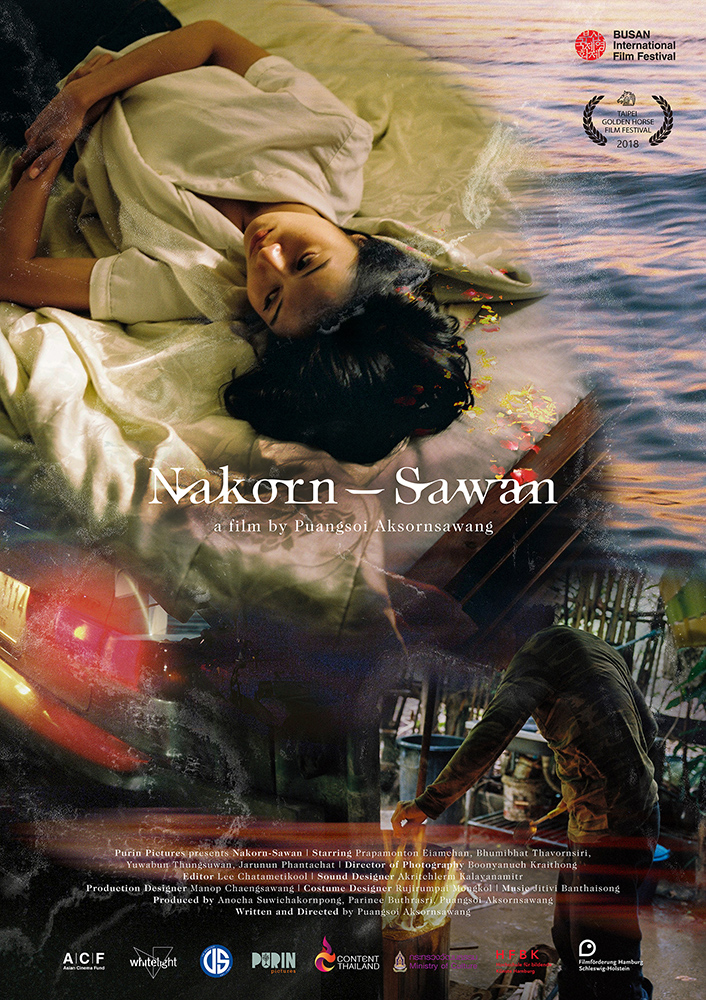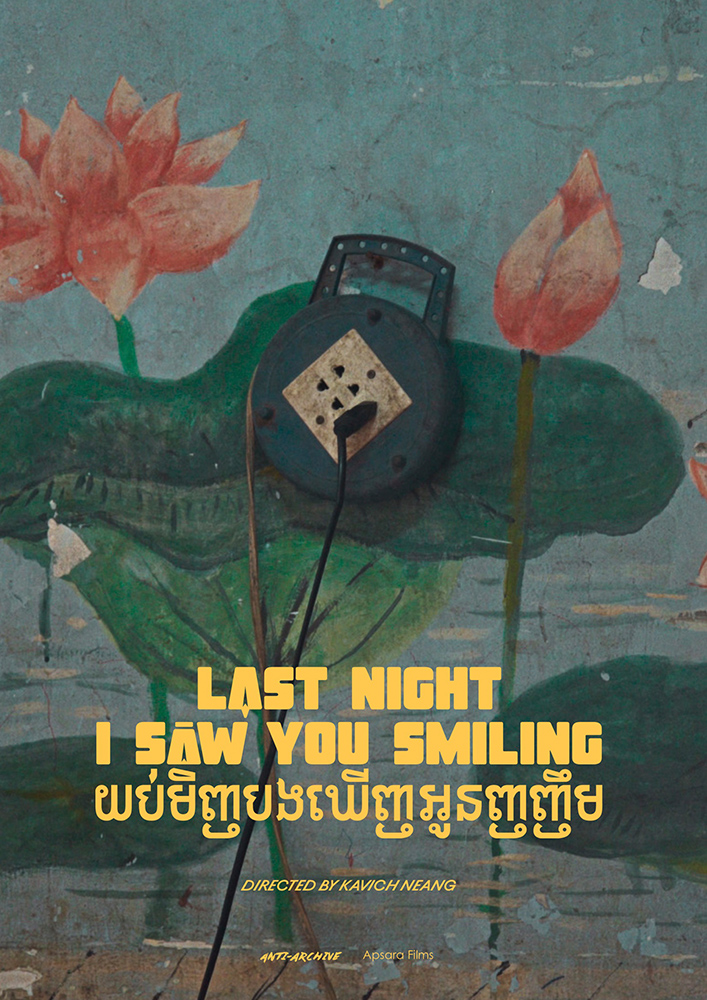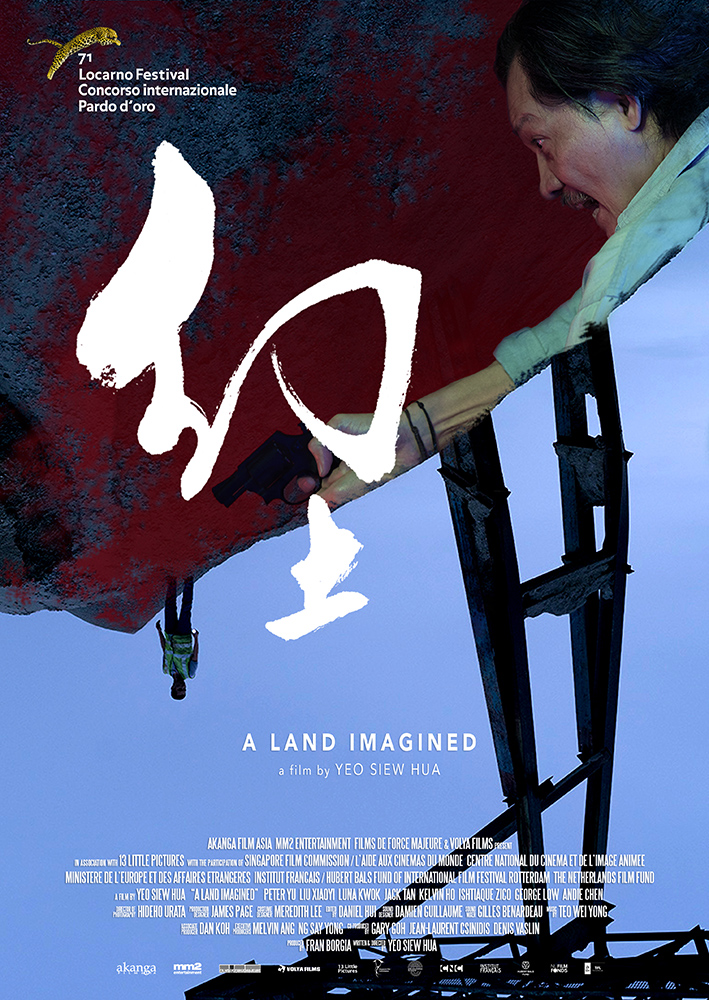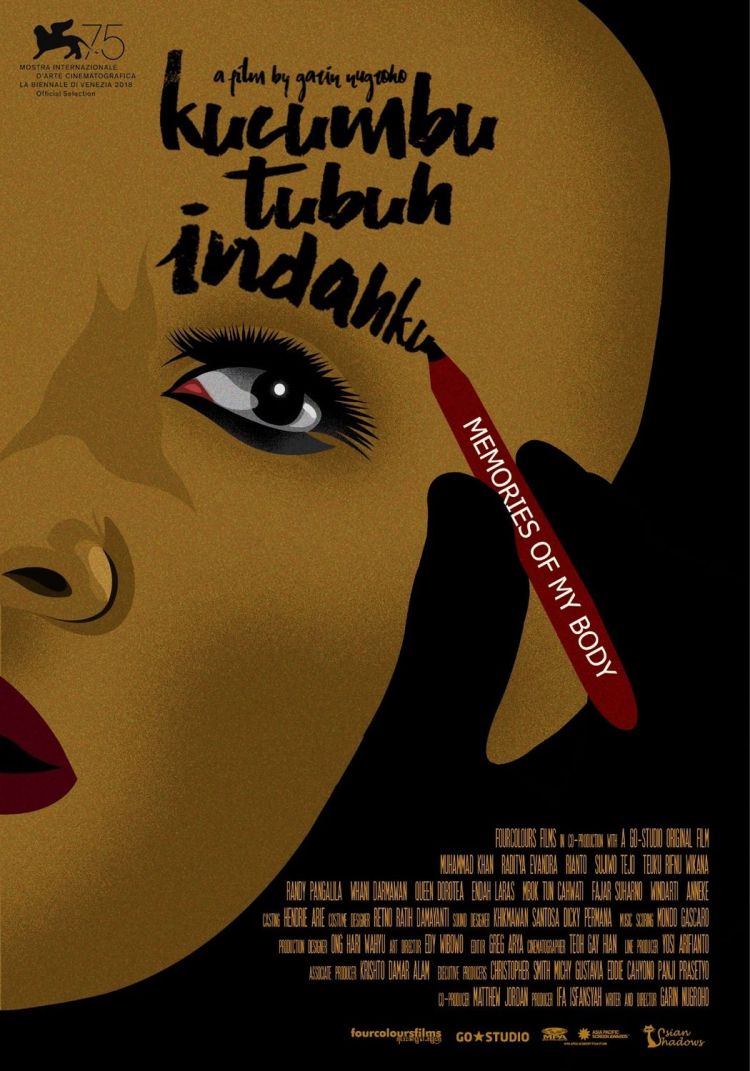Film Screenings
We are proud to screen a selection of award-winning films alongside our conference program. Events marked “Public Screening” below take place outside of session hours and are therefore open to everyone, not just conference participants. If you’re from the Berlin area, feel free to invite your friends! Events marked "Exclusive Screening" are open solely to participants of the conference. Screenings are accompanied either by Q&As with the directors, or commentaries by special guests. Details on all films are provided below.
The film program was coordinated by Dr. Rosa Cordillera A. Castillo and co-curated with Rosalia Engchuan.
Tuesday, 10 September 2019
| 19:00–21:00 | Nakorn-Sawan (2018)Fritz-Reuter-SaalPublic Screening |
Thursday, 12 September 2019
| 13:30–15:30 | Last Night I Saw You Smiling (2019)Room 1.205Exclusive Screening |
| 17:15–19:15 | Transit (2013)Fritz-Reuter-SaalPublic Screening |
Friday, 13 September 2019
| 13:30–15:30 | A Land Imagined (2018)Room 1.205Exclusive Screening |
| 18:00–20:00 | Memories of My Body (2018)Fritz-Reuter-SaalPublic Screening |

Nakorn-Sawan (2018)
Directed by Puangsoi AksornsawangThailand & Germany | Feature Film | 77 min
- Reality and Fiction
- Love and Loss
- Life and Death
Time & Location
Tuesday 19:00–21:00
Fritz-Reuter-Saal
Synopsis
Negotiating the many pathways between life and death in Thailand, debut filmmaker Aksornsawang juxtaposes documentary and fiction to create an unusual, haunting vision. The casual, personal video she made with her parents before her mother died resonates with the polished autobiographical narrative of a woman traveling with her family to scatter the ashes of her mother near “Heavenly City”. Together, we share in her worlds of love and loss, the expression of a daughter who is also an artist.
Director’s Statement
“In Nakorn Sawan, I try to collect my experiences, my feelings and my memories about my parents. I construct and re-construct to see how my memories could work with my fiction, whilst in my process of making this film. Do I write this fiction from my experiences or do I experience the fiction while writing the truth? I discover my narration during writing, pre-production and even during production. I reflect my memories, my mother’s death, my father’s existence, some pieces from my actors’ memories, experiences from the crew, even some political situations that cannot be spoken of, and also, my own self during the lost time. Memories are (re)constructed to be remembered and forgotten. They erode through time so the only thing we could do is to embellish it as long as we want; as long as we still exist; as long as we would like to be a part of each other; and as long as we still want to keep us in the film, not just you or not just me.”
About the Director
Puangsoi Aksornsawang graduated from the Motion Picture and Still Photography Department of Chulalongkorn University, Bangkok, Thailand. In 2011, she started her film production career as an assistant director and a scriptwriter for the feature films 36 by Nawapol Thamrongrattanarit and The Isthmus by Sopawan Boonnimitra and Peerachai Kerdsint. In 2014, she received the DAAD (German Academic Exchange Service) scholarship and graduated with a degree in Master of Fine Arts at the University of the Arts Hamburg in Germany in 2018. Nakorn Sawan (Former name: Rahula) is Puangsoi’s first feature film and was selected to participate in the South East Asian Film Lab in the Singapore Film Festival 2016. She is currently based in Bangkok, Thailand working as a director, a writer and a scriptwriter.
Produced by
Parinee Buthrasri and Anocha Suwichakornpong
Awards
- Singapore International Film Festival 2016: Special Mention Award (Southeast Asian Film Lab)
- Taipei Golden Horse Film Festival 2018: Observation Mission for Asian Cinema Award
Q&A with
Puangsoi Aksornsawang (Director)
Moderated by
Rosalia Engchuan (Max Planck Institute)
Rosalia Namsai Engchuan is a social anthropologist and filmmaker working with audio visual media creators in Southeast Asia. She is currently pursuing her Ph.D. at the Max Planck Institute for Social Anthropology in Halle, Germany. Her Ph.D. project looks at Indonesian film communities as alternative pedagogical spaces and investigates cinematic practices as a relational, socio-technical process of collective agency. Grounded in her theoretical interest in the creation of knowledge(s) and alternative ways of knowing her methodology of looking at film not as text but as language is an attempt at a decidedly de-colonial practice. She is part of the Berlin / Bangkok based artist collective un.thai.tled and curates film screenings and discussions with a focus on Southeast Asian / Diaspora independent and experimental film.

Last Night I Saw You Smiling (2019)
Directed by Kavich NeangCambodia & France | Documentary | 78 min
- Displacement
- Land Rights
- Architecture
- Heritage
- Urban Studies
Time & Location
Thursday 13:30–15:30
Room 1.205
Synopsis
One decade after Cambodia’s independence and amid a movement of New Khmer Architecture, Cambodian architect Lu Bun Hap and Soviet architect Vladimir Bodiansky constructed the Municipal Apartments, also known as the White Building. The housing block bore witness to a tremendous series of events: the young nation’s Golden Age; a traumatic breakdown under a radical regime; decades of cultural revival centered within its walls; and, the rapid pace of capitalist development that would ultimately lead to its demise. When director Kavich Neang learns the 493 families of the White Building, an architectural landmark in Phnom Penh where he lived since birth, have agreed to vacate for a condo development, he decides to document the last days, starting by following his parents and family. His father, a sculptor with the Ministry of Culture and Fine Arts, and his mother arrived to the White Building when the government gathered surviving artists to live there after 1979. They express satisfaction with the compensation, but they argue amid the pressure of the move-out process. By the time that they leave, they cannot contain their emotions anymore. Sophanara Dy, 68, moved into the White Building after the Khmer Rouge fell in 1979. She first refused to leave but accepted after pressure from her neighbors. She shares the stories of love and tragedy she has witnessed inside the building and in the movies from the past which she still treasures dearly. Sandap Suos, 60, arrived in 1981 but sold her flat in the 1990s, but after her husband died, she came back to rent it alone. Although she will not receive compensation for the flat, she feels no regret: it’s her destiny, she claims. Her dream was to become a singer, so she sings a pop song alone in her home for the last time. After 54 years, the building returns to brick, metal, and concrete once more. Only memory remains.
Director’s Statement
“The White Building itself offered very strong and unique visuals. Its long, dark corridors embody my own memories. I patiently observed the residents’ behaviors during those last days, to capture how their slow gestures and stories shared while packing the things they lived with for so many years express a deeper heritage. I searched obsessively for little signs of life and resistance: a 60s’ pop song sung for the last time, an old memory told in the place it happened, the abandoned objects on the floor of a building that, progressively in the film, grows emptier and emptier. The film’s shots and sounds present the spirit of the building, even for a first time visitor. The color brings out the analog fuzziness of my dreams and memories. In the White Building’s final days, I returned to stand amid the empty space before its demolition and have those long, engaged conversations with my parents and older neighbors which I had never pushed myself to begin. My imagination raced as I listened to their stories or opinions. Much of what they said brought about my own memories: I recalled kids playing, neighbors singing, ladies chit-chatting, monks chanting, babies crying. But those images and sounds are gone now. This is my chance to use cinematic expression to bring the building back to life. Essential to the film is the non-visual: sound. With a library my sound designer recorded before, during, and after the real building’s demolition, the soundscape of the film gives the distinct feeling of a living, vibrant building. Music plays throughout, with pop songs from the past and present that recall the building’s vivaciousness and composed minimalist tracks which evoke my own sense of foreboding and loss. As I conceive this film, I find myself inside the building again. These images and sounds return to me and dare to overcome the reality that has snuffed them out.”
About the Director
Kavich Neang (director and cinematographer) was raised in Phnom Penh’s landmark White Building. His first two shorts were documentaries produced by Rithy Panh: A Scale Boy (2010), and Where I Go (2013). In 2013, he joined Busan’s Asian Film Academy, and in 2014, he co-founded Anti-Archive. In 2015, he directed two short fictions, Three Wheels (premiere: Busan), and Goodbye Phnom Penh. In 2018, his short fiction, New Land Broken Road, premiered in Singapore. Kavich has joined Talents Tokyo, Visions du Reel’s Docs-in-Progress, and Cannes Cinéfondation’s Residency. His feature-length documentary Last Night I Saw You Smiling holds its premiere in January 2019 in IFFR’s Bright Future competition. He is simultaneously preparing to shoot his first narrative feature, White Building.
Produced by
Davy Chou, Daniel Mattes and Marine Arrighi de Casanova
Awards
- Rotterdam International Film Festival 2019: NETPAC Award (Bright Future Competition)
- Jeonju International Film Festival 2019: Special Jury Prize
- Los Angeles Asian Pacific Film Festival 2019: Special Jury Award
Commentary by
Rosalia Engchuan (Max Planck Institute)
Rosalia Namsai Engchuan is a social anthropologist and filmmaker working with audio visual media creators in Southeast Asia. She is currently pursuing her Ph.D. at the Max Planck Institute for Social Anthropology in Halle, Germany. Her Ph.D. project looks at Indonesian film communities as alternative pedagogical spaces and investigates cinematic practices as a relational, socio-technical process of collective agency. Grounded in her theoretical interest in the creation of knowledge(s) and alternative ways of knowing her methodology of looking at film not as text but as language is an attempt at a decidedly de-colonial practice. She is part of the Berlin / Bangkok based artist collective un.thai.tled and curates film screenings and discussions with a focus on Southeast Asian / Diaspora independent and experimental film.

Transit (2013)
Directed by Hannah EspiaPhilippines | Feature Film | 93 min
- Immigration
- Migrant Rights
- Deportation
- Third-Culture Children
Time & Location
Thursday 17:15–19:15
Fritz-Reuter-Saal
Synopsis
Transit explores the intersecting stories of Filipinos in Tel Aviv when the threat of a law deporting the children of migrant workers looms over their precarious lives. Janet, a domestic worker on an expired visa, struggles to hide her half-Israeli daughter, Yael—a rebellious teenager caught up in a juvenile romance. Most endangered in the situation is four-year-old Joshua, whom Janet and Yael protect because the boy’s father, Moises, works on weekdays as a caregiver in the city of Herzliya. The film also explores the life of a young lady, Tina, who arrives to start a new life in Israel. Transit examines what it means to be a family and what it means to be a stranger, within one’s home and in a foreign land.
Directorial Statement
“Transit was inspired by my personal encounter with a Filipino migrant worker who has had to bring home his three-month old baby after a law was implemented deporting children of migrant workers in Israel. From there, I was compelled to forge a story that delves not just into the struggles of Filipino migrant workers abroad, but more importantly, one that explores the psychological turmoil of children who were born and raised in a foreign land. I wanted to tell a story about youth who struggle with identities and sense of nationhood, children whose tongues are caught in the clash of cultures, tongues who have no love for Filipino food or the Filipino language, Filipino children who are forcefully uprooted from the world that they know – who seem to be citizens of no country. These children are the new people of Diaspora.”
About the Director
Hannah Espia-Farbova is a film and television director from Manila, Philippines. Her 2013 debut feature Transit, premiered at the Busan International Film Festival to critical acclaim and was the Philippines’ entry to the 86th Academy Awards. In 2018, Transit screened at the MoMA as part of the film series “A New Golden Age: Contemporary Philippine Cinema” and was ranked 11 out of 100 Best Filipino Films directed by Women in a 2019 poll by Filipino critics. Espia-Farbova was the third female director to win the prestigious Gawad Urian Philippine Critics’ Award for Best Director. Recently, she was featured in Kore Magazine’s “The New Hollywood” issue as one of five Visionary Asian-American Female Filmmakers. Espia-Farbova is currently taking her MFA in Film at Ohio University as a Fulbright Scholar. She has been writing and developing her second feature screenplay Everything Will Be Fine (formerly, Learning to Build a Fire) since 2014 with the support of the Berlinale Talents Script Station, Asian Cinema Fund, and Talent’s Tokyo Next Master’s Support Program.
Produced by
Dean Devlin and Paul Soriano
Awards
- Cinemalaya Independent Film Festival 2013: Best Film, Best Director, Audience Choice Award, Best Actress, Best Supporting Actress, NETPAC Award
- Tokyo FILMeX 2013: Student Jury Prize
- Busan International Film Festival 2013: Special Mention
Commentary by
Prof. Claudia Liebelt (Bayreuth University)
Claudia Liebelt is Associate Professor in Social Anthropology at the University of Bayreuth. As of October 2019, she will be a Guest Professor in Gender and Diversity Studies at Freie Universität Berlin. She has authored Caring for the 'Holy Land': Filipina domestic workers in Israel (Berghahn, 2011) and published numerous articles on the Filipino labour diaspora, care and domestic workers, migration and citizenship.
Moderated by
Dr. Rosa Cordillera A. Castillo (Humboldt-Universität zu Berlin)
Rosa Cordillera A. Castillo (Ph.D., Freie Universität Berlin) is a Filipina anthropologist and assistant professor at Humboldt-Universität zu Berlin’s Institute of Asian and African Studies. She is the founder of the Philippine Studies Series Berlin, a leading platform for lectures, discussions, and art and film events regarding the Philippines and its diaspora. She is also the head of the project Advancing Philippine Studies at HU Berlin. Prior to moving to Berlin in 2011, Rosa taught anthropology for four and a half years at the University of the Philippines Diliman and Manila campuses. Her research interests include violence peace studies, memory, imagination, emotions, and temporality.

A Land Imagined (2018)
Directed by Yeo Siew HuaFrance, Netherlands & Singapore | Feature Film | 95 min
- Transnationality
- Migrant Rights
- Exploitation
- Land Reclamation
- Virtual/Liminal Spaces
Time & Location
Friday 13:30–15:30
Room 1.205
Synopsis
Set in industrial Singapore, police investigator Lok must find missing migrant worker Wang. Wang suffers a worksite accident and is anxious about repatriation. Unable to sleep, Wang starts frequenting a dreamy cybercafé in the dead of the night. Hoping to look for some form of human connection in this foreign land he feels alienated from, Wang forms a virtual friendship with a mysterious gamer that takes a sinister turn. When Wang suddenly disappears, Lok digs deep into the trail leading to a land reclamation site, in order to uncover the truth beneath all that sand.
Directorial Statement
“Singapore has garnered itself a reputation as a modern economic miracle, turning itself from a fishing village to a thriving modern economy over the short period of only a few decades. Such a feat is possible due to its ability to systematically engineer a land designed through land reclamation and endless construction projects. By perpetually reshaping itself, it negates natural geographical formations, rendering them into perfectly straight and angular shorelines – a land as though imagined up by some geometrical mind. Even the people on this imaginary land are at the same time equally imagined. As a country of immigrants, its demography is wholly dependent on migration policies and economic considerations. New migrants are brought into the fold to reinvigorate the imagination of this economic miracle – a success story that is built upon the backs of low wage migrant labourers from the region who are hired to build a nation they can never become a part of.”
About the Director
Yeo Siew Hua studied philosophy at the National University of Singapore and is a member of the 13 Little Pictures film collective. He wrote and directed the experimental film, In the House of Straw (2009). He participated in the 2015 edition of Talents Tokyo and pitched at Autumn Meeting 2016, where he won the Grand Prix for his second fiction feature, A Land Imagined (2018). The film also took part in the Asia Pacific Screen Lab 2017 and is a recipient of the Hubert Bals Fund and the Aide aux Cinema du Monde.
Produced by
Fran Borgia
Awards
- Locarno International Film Festival 2018: Golden Leopard
- Asia Pacific Screen Awards 2018: Young Cinema Award and Achievement in Cinematography
- Singapore International Film Festival 2018: Lesley Ho Asian Film Talend Award
Q&A with
Yeo Siew Hua (Director)
Moderated by
Rosalia Engchuan (Max Planck Institute)
Rosalia Namsai Engchuan is a social anthropologist and filmmaker working with audio visual media creators in Southeast Asia. Her current project ‘The Stories before Film’ looks at the cinematic practices of independent film communities in Indonesia. Her work uses the lens of cinematic practices to look at film from an ethnographic perspective. Her writing is concerned with the roots and becoming of the larger ecosystem of independent film communities in Indonesia, the entanglements of the ritualistic performance of religion, shamanism and technology on film sets and the politics of nation building from the grassroots and its manifestation in a very particular Indonesian aesthetic. Grounded in her familiarity with ‘The Stories before Film’ through long-term fieldwork her ethnographically informed film analysis focuses on the depiction of environmental otherness, negotiations on religion, non-normative sexuality and acts of history-altering through cinematic practices. Through her artistic practice, Rosalia creates playful alternate realities as a contemplation on her experience of “reality”.

Memories of My Body (2018)
Directed by Garin NugrohoIndonesia | Feature Film | 105 min
Time & Location
Friday 18:00–20:00
Fritz-Reuter-Saal
Synopsis
Juno is just a child when his father abandons him in their village of Center Java. Alone now, he joins a Lengger dance center where men shape their feminine appearance and movement. But the sensuality and sexuality that come from dance and bodies, mixed with the violent social and political Indonesian environment, force Juno to move from village to village. Even if on this journey Juno receives attention and love from his dance teachers, his weird aunty, his old uncle, a handsome boxer and a Warok, he still has to face by himself the battlefield that his body is becoming.
Directorial Statement
“A film is a personal statement or expression of anxiety about the surrounding personal and socio-political issues. The joy of making a movie comes when it succeeds to deliver such messages. I have made 18 films containing various themes; from early 19th century as a backdrop to the present Indonesia; from Islamic radicalism, economic liberalism, to the country’s communist pogrom; all condensed in little stories from various islands in Indonesia. This time, I am very interested in the issue of masculinity and femininity merged in a person’s body. Having a body that is both masculine and feminine has been a very sensitive issue in Indonesia, the country with the largest Muslim population in the world.”
About the Director
Garin Nugroho was born in Jogjakarta, Indonesia in 1961 and completed his studies in 1985 at the film academy in Jakarta. His debut film Love is a Slice of Bread (1991) was selected as the Best Young Director at the Asia Pacific International Film Festival. His second feature Letter for an Angel (1994) won Best Film at Taormina and Tokyo. His following Leaf on a Pillow (1998) opened in Un Certain regard, Cannes and won the Special Jury Prize in Tokyo. Bird Man Tale followed, which won the NETPAC award at the Belinale in 2002. His Opera Java, produced as part of the celebration of the 250th birthday of Mozart, premiered in Venice in 2006 and won awards in Tokyo, Cinemanila and Singapore. Memories of My Body is his 19th feature film.
Produced by
Ifa Isfansyah
Awards
- Festival des 3 Continents 2018: Montgolfiére d’Or Award (Best Film)
- Asia Pacific Screen Award 2018: Cultural Diversity Award
- Premio Maguey Award 2019: Jury Prize
Commentary by
Ferdiansyah Thajib (Freie Universität Berlin)
Ferdiansyah Thajib is a Ph.D. Candidate at the Institute of Social and Cultural Anthropology, Freie Universität Berlin. His life work is situated in the intersections of theory and praxis, with specific research interests on queer modes of endurance and forms of affective entanglement in everyday life. He is also a member of KUNCI Cultural Studies Center (Yogyakarta), a research collective which focuses on critical knowledge production and sharing through cross-disciplinary encounter, artistic practice, action-research, and vernacular education within and across community spaces.
Moderated by
Dr. Rosa Cordillera A. Castillo
Rosa Cordillera A. Castillo (Ph.D., Freie Universität Berlin) is a Filipina anthropologist and assistant professor at Humboldt-Universität zu Berlin’s Institute of Asian and African Studies. She is the founder of the Philippine Studies Series Berlin, a leading platform for lectures, discussions, and art and film events regarding the Philippines and its diaspora. She is also the head of the project Advancing Philippine Studies at HU Berlin. Prior to moving to Berlin in 2011, Rosa taught anthropology for four and a half years at the University of the Philippines Diliman and Manila campuses. Her research interests include violence peace studies, memory, imagination, emotions, and temporality.

